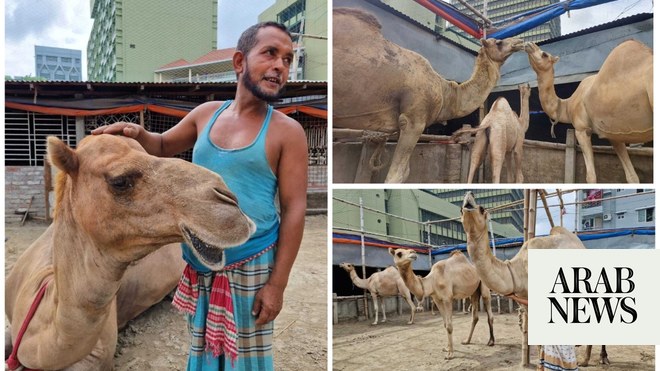
Animal sacrifice is an important activity for many local Muslim communities in Malaysia during the Hajj celebration
KUALA LUMPUR: In a country where about 60 percent of the population are Muslims, the Feast of the Sacrifice day holds a significant meaning for the community in Malaysia.
The mosque takes center stage as locals perform their ritual sacrifice and gather for special prayers.
One example is the Mosque of Jami’Ilhuda Kampung Melayu Ampang, situated in one of the few Malay enclaves in the capital city. At dawn on Sunday, hundreds of Muslims flock to the mosque for a special morning prayer.
The majority of the residents are Malay-Muslims, however there are pockets of Indian-Muslims community as well as refugee and migrant Muslims.
“We do the ritual sacrifice for the Hajj celebration every year,” said Hajji Hassan Che Kob, 64, the chairman of the mosque.
“This year we have 23 cows and one sheep to be slaughtered.”
He told Arab News that the cows are purchased by the local community for the Feast of Sacrifice. “We are selective about the vendors, we only choose the best-quality cows (that are) large-built and affordable.”
“The real meaning of sacrifice is a sacrifice of ourselves, our time and our material wealth for Allah,” Hajji Hassan said. Weeks before the Hajj celebration, the mosque announces the purchasing of cows to residents.
The cost of each cow is usually shared by a maximum of seven people, referred to as ‘the participants.”
“This is part of the Islamic virtue,” said Norchahaya Hashim, 60, a retired government servant. Every year she buys a cow and donates it to the mosque for sacrifice. This year was no different. “This is to emulate the virtual acts of Prophet Ibrahim and Prophet Ismail,” Norchahaya said.
“I always encourage our friends and family to purchase a cow for sacrifice during the Hajj celebration. We would usually put aside some money every month to afford it,” she said.
Animal sacrifice is an important activity for many local Muslim communities in Malaysia during the Hajj celebration. It is also a spectacle; curious young children and local people watch the ritual sacrifice take place at the compound next to the mosque.
In less than half an hour, all 23 cows and one sheep were slaughtered, and the meat was divided into smaller chunks for the participants, the mosque staff, the poor and nearby residents.
Meanwhile, on the other side of the mosque, staff were busy cooking and chopping meat and vegetables at the makeshift kitchen. The food was served for the local community as part of the celebration for the feast.
“The sacrifice meat is fresh and tastier, the mosque staff would usually make soups and curries out of the meat chunks,” said Norchahaya, who, as one of the participants, was given 2 kg of meat. “Many residents will come here throughout the day and night for the Feast of Sacrifice because of the community atmosphere.”











